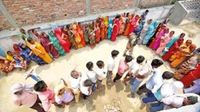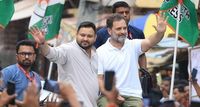India, the world’s largest democracy, is in the throes of a heated political storm over allegations of “vote theft” and electoral irregularities—accusations that have not only rocked the corridors of power but also called into question the credibility of some of the nation’s most trusted institutions. This controversy, which erupted in the wake of the 2024 general elections and has intensified through mid-2025, has pitted the ruling Bharatiya Janata Party (BJP) and the Election Commission of India (ECI) against a galvanized opposition, led by the Congress party and its prominent leader Rahul Gandhi.
What’s at stake? At its core, the dispute is about the sanctity of the electoral process—an issue that resonates deeply in a country where nearly a billion people are registered to vote. The last time a prime minister was re-elected for a third consecutive term was in 1962, when Jawaharlal Nehru achieved the feat. In 2024, Prime Minister Narendra Modi repeated this historic accomplishment, further solidifying the BJP’s dominance and leaving the Congress party out of power for an unprecedented 11 years, with at least four more years expected before their next real shot at returning to government (as reported by BBC and other outlets).
Yet, this string of BJP victories has not come without fierce contestation. After three consecutive election defeats, Congress has cycled through various explanations for its losses—first accusing the BJP of “communal polarization,” then suggesting manipulation of electronic voting machines (EVMs), and now alleging “vote theft” through manipulation of electoral rolls. According to BBC, Rahul Gandhi has become the face of these new allegations, claiming that widespread voter manipulation—including duplicate registrations, invalid addresses, and bulk additions of voters at single locations—tipped the scales in the BJP’s favor during the 2024 parliamentary elections.
Gandhi’s charges are detailed and, at times, dramatic. At a press conference in Delhi on August 12, 2025, he cited granular data from the electoral body, zeroing in on the Mahadevapura assembly segment in Karnataka’s Bengaluru Parliamentary constituency. He alleged that more than 100,000 manipulated entries appeared on the voter list, including instances of multiple voters registered at a single address and even individuals, like Shakun Rani, purportedly casting ballots twice. Gandhi also accused the ECI of destroying evidence by deleting CCTV footage from polling booths after 45 days, unless an election result is legally challenged—a practice the ECI defends as standard procedure for managing election disputes (as reported by ANI and BBC).
The Congress party claims that such irregularities cost it at least 48 seats in the 2024 general elections, where it secured 99 out of 543 Lok Sabha seats, compared to the BJP’s 240. Gandhi has gone so far as to demand that the ECI release digital voter rolls for public audit, arguing that transparency is the only way to restore faith in the electoral process. “There are unlimited cases like that. ‘Abhi picture baki hai’ [the story is not over yet],” Gandhi said, referencing a 124-year-old voter’s name in the draft electoral list for Bihar (BBC).
These allegations have sparked an uproar in parliament, with opposition MPs demanding a debate on the integrity of India’s electoral system. Tensions boiled over on August 12, 2025, when dozens of opposition leaders, including Gandhi, were briefly detained by police as they attempted to march to the ECI headquarters. Parliament was ultimately adjourned as the row escalated (BBC).
The BJP and the Election Commission have responded with equal vigor. The ECI, in a statement on social media platform X, labeled Gandhi’s claims “absurd” and called for him to either submit a signed declaration under oath or apologize to the nation. The Karnataka state unit of the ECI noted that Congress did not file formal objections during the revision of the electoral roll ahead of the 2024 elections. The ECI also reiterated its privacy policies, defending the deletion of CCTV footage after the 45-day window for legal challenges, and questioned the ethics of presenting voter photos to the media without consent (as reported by ANI).
BJP leaders have been even more forceful in their rebuttal. Federal education minister Dharmendra Pradhan described the opposition’s campaign as “extremely worrying and dangerous for democracy,” while federal agriculture minister Shivraj Singh Chouhan accused Gandhi and the opposition alliance of “defaming democracy, tearing it to shreds, and tampering with the dignity of constitutional institutions” (BBC).
One of the most contentious flashpoints in this ongoing battle is the Special Intensive Revision (SIR) of electoral rolls in Bihar, conducted between June and July 2025 ahead of the state’s upcoming elections in November. The SIR was the first such update since 2003 and involved officials visiting all 78.9 million registered voters in Bihar for verification. The result? The draft rolls for Bihar now list 72.4 million names—6.5 million fewer than before. The ECI says these deletions targeted deceased individuals (2.2 million), duplicate registrations (700,000), and migrants (3.6 million). Corrections remain open until September 1, 2025, with over 165,000 applications already received (BBC).
Opposition parties, however, have cried foul, alleging that the process has disenfranchised large numbers of voters, particularly migrants and minorities. Yet, as reported by The Sunday Times and other sources, not a single individual whose name was deleted has come forward to file a complaint, even two weeks after the publication of the draft rolls. The Supreme Court of India is currently hearing petitions challenging the SIR, with petitioners demanding publication of the deleted names along with reasons for their removal. The court has remarked that the allegations “largely appears to be a case of trust deficit, nothing else,” but has promised to intervene “immediately” if mass exclusion is proven (BBC).
Adding fuel to the fire, Congress leader Pawan Khera lambasted Chief Election Commissioner Gyanesh Kumar’s recent press conference, saying, “It seemed like a BJP leader was speaking today… Did he give any response about the 1 lakh voters we exposed in Mahadevapura?” Khera’s remarks underscore the opposition’s deep skepticism about the ECI’s impartiality (ANI).
Meanwhile, the ECI’s defenders point to the institution’s long-standing reputation for fairness and its role as a model for election management worldwide. Historically, few losing parties have accused the ECI of bias, and Indian democracy has enjoyed global respect for its robust and transparent electoral processes. Critics of the Congress argue that blaming institutions like the ECI is simply a case of “a bad workman blaming his tools,” and that the party would do better to examine its own shortcomings rather than attack the credibility of constitutional bodies (as highlighted in The Sunday Times).
As India moves toward key state elections and a nationwide review of electoral rolls, the debate over “vote theft” shows no sign of abating. The outcome of ongoing legal challenges and the response of the ECI will likely shape the future of Indian democracy—and determine whether public trust in the electoral process can be restored.
For now, the battle lines remain firmly drawn, with each side convinced of its own righteousness and the stakes—nothing less than the legitimacy of the world’s largest democracy—higher than ever.


